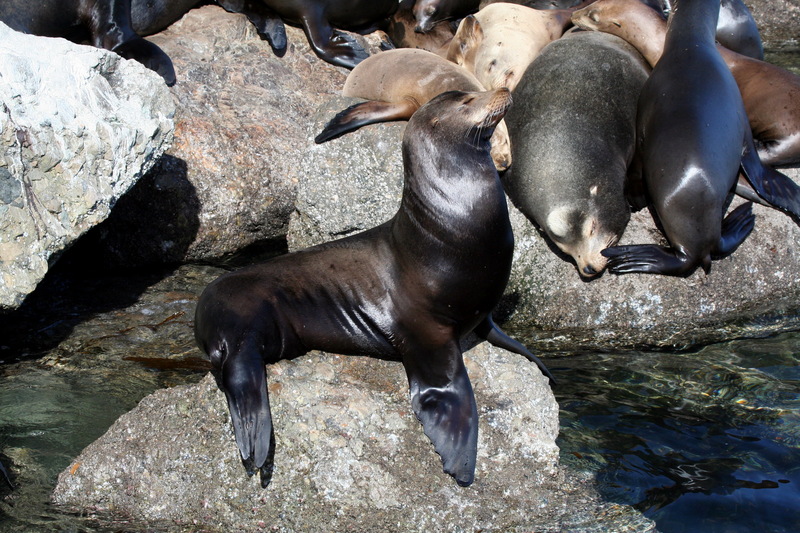|
| Query: eumetopias jubatus | Result: 35th of 62 | |
Sea Lions (part of Family: Otariidae) - Wiki
| Subject: | Sea Lions (part of Family: Otariidae) - Wiki
| |

| Resolution: 2250x1500
File Size: 1614925 Bytes
Date: 2006:05:07 15:54:39
Camera: Canon EOS DIGITAL REBEL XT (Canon)
F number: f/9.0
Exposure: 1/125 sec
Focal Length: 115/1
Upload Date: 2007:12:21 15:30:36
|
Sea lion
From Wikipedia, the free encyclopedia
Order: Carnivora
Suborder: Pinnipedia
Family: Otariidae
Genera: Eumetopias, Zalophus, Otaria, Neophoca, Phocarctos
[Photo] Zalophus californianus californianus (California Sea Lions), at Monterey Breakwater, California.Date 05/05/2006. Author David Corby. Copyright (C) 2006 David Corby
Permission is granted to copy, distribute and/or modify this document under the terms of the GNU Free Documentation License, Version 1.2 or any later version published by the Free Software Foundation; with no Invariant Sections, no Front-Cover Texts, and no Back-Cover Texts. A copy of the license is included in the section entitled "GNU Free Documentation License". |
A sea lion is one of many marine mammals of the family Otariidae. Sea lions are characterized by the presence of external ear pinnae or flaps, long front flippers, and the ability to walk on four flippers on land. They are generally found in shallow waters of coastal areas of both northern and southern hemispheres, with abundant food sources.
Sea lions of many species have seen a severe and rapid decrease in numbers in recent years. Many factors including overfishing of prey species, shooting by fishermen and pollution have probably contributed to the decline. The population of Steller sea lions in Alaska has declined as much as 80% since the 1970s. In contrast, California sea lions are abundant and the population continues to expand at a rate of approximately 5.0% annually, as it has since the mid-1970s.
Sea lions are often a popular attraction at zoos and aquariums, performing behaviors such as throwing and catching balls on their noses and clapping.
Hybrids
A hybrid sea lion from a cross between the California sea lion (Zalophus californianus) and the South American sea lion (Otaria byronia) has occurred.
Sea lions and humans
The government of Japan has set a quota of 116 kills per year in Hokkaido, as sea lions are seen as a threat to commercial fisheries. International environmentalists and local fishery advocates continue to debate the issue.
The Norwegian government has set a quota of 200 kills per year.
Sea lions have been trained by the U.S. Navy's Marine Mammal Program, based in San Diego to detain scuba divers.
Sea lion attacks on humans are rare, but have occurred in at least a single notable case, in which a 13 year-old Australian girl was attacked while in the water. Sources said that the likeliest explanation was that the animal was attempting to play with the girl.
The Moche people of ancient Peru worshipped the sea and its animals. They often depicted sea lions in their art.
Species
Family Otariidae
Genus Eumetopias
Steller Sea Lion, Eumetopias jubatus
Genus Neophoca
Australian Sea Lion, Neophoca cinerea
Genus Otaria
South American Sea Lion, Otaria flavescens
Genus Phocarctos
New Zealand Sea Lion or Hooker's Sea Lion, Phocarctos hookeri
Genus Zalophus
California Sea Lion, Zalophus californianus
Japanese Sea Lion, Zalophus japonicus - extinct (1950s)
Galapagos Sea Lion, Zalophus wollebaeki
http://en.wikipedia.org/wiki/Sea_lion
| The text in this page is based on the copyrighted Wikipedia article shown in above URL. It is used under the GNU Free Documentation License. You may redistribute it, verbatim or modified, providing that you comply with the terms of the GFDL. |
|
Comments |
|---|
| | Guest |
|
| Sea lions are large, ranging from around 150 kg to over 1000 kg, and males tend to be much larger than females. Their bodies are slender and elongate. Small, cartilaginous external ears are present. All otariids have fur. In the sea lions, relatively coarse hairs predominate, while in the fur seals, dense underfur is also present. Colors are generally shades of brown, without stripes or other contrasting markings. The fore flippers of otariids are long and paddle-like, more than 1/4 of the length of the body. The surfaces of the fore flippers are naked and leathery, and claws are present but small. The hind flippers are also large. They differ from those of true seals ( phocids) in that they can be rotated under the animal when it is on land, partially supporting the body and helping in locomotion. Otariids also have a small but distinct tail. Males have a baculum. |
| | Guest |
|
Zalophus californianus californianus
California Sea Lion |
^o^
Animal Pictures Archive for smart phones
^o^
|
|
|

